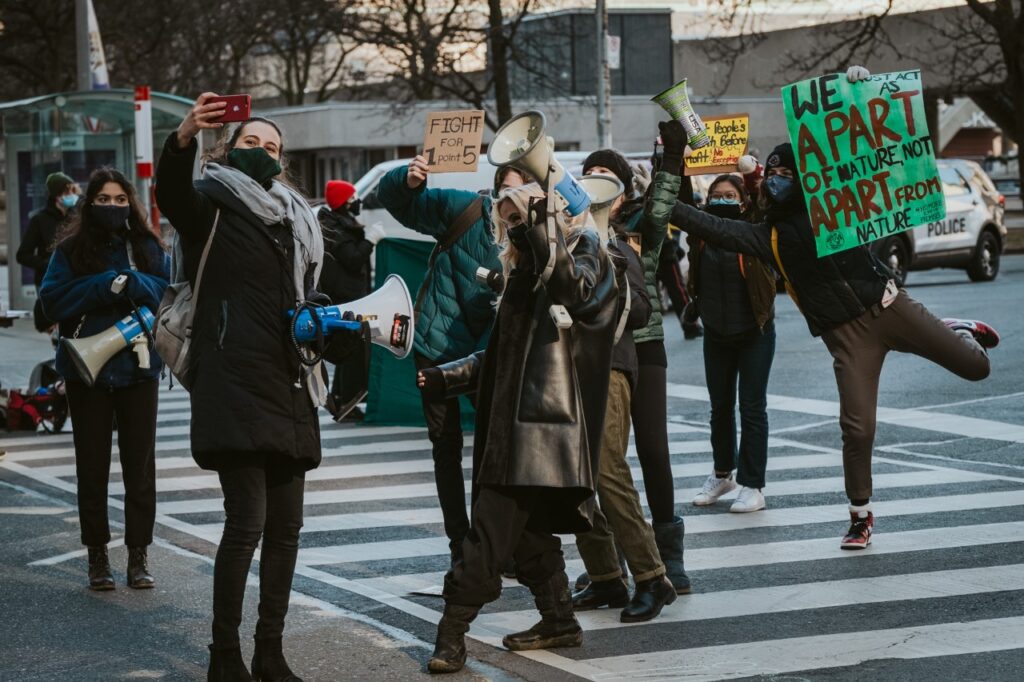Blocking business as usual to create change: A counterproductive tactic or pathway to a better world?

Activists like me don’t claim to be the solution to climate change, but we are the fire alarm that allows for the rest of the climate justice ecosystem to intervene.
Aliénor Rougeot, 2021
In September 2019, millions worldwide were out in the street to protest inaction on climate change. These large protests, led by young climate strikers like myself, were not intended to simply be a parade of witty signs and clever chants – although both were welcome! Instead, the purpose was to disrupt business as usual and to send a clear signal to those who hope to maintain the status quo: the way we currently produce, consume, and live is not sustainable. The youth and their adult allies categorically refuse to allow it to continue.

Praised by many, we were also criticized by some. As one of the leaders of Toronto’s climate strikes for the past two years, I received messages ranging from constructive criticism to outright hate. Although most parents thank me for allowing their children to voice their anxiety surrounding the heavy topic of climate change, a few see me as a problem. “You are brainwashing my daughter to have her skip school,” said one woman via Twitter.
Others often affirm “bothering everyday people with your strikes will only hurt your cause.”
In the media and in my private messages, the idea that we are counter-productively blocking streets and skipping school instead of ‘asking nicely’ and in a ‘normal’ manner is often expressed. So, it is worth asking and answering this seemingly common question: is blocking business as usual a good way to make it change?
Asking nicely would have been my preferred method, trust me. I pay thousands for my education and had no intent to skip any of it when I enrolled. I enjoy my safety, my calm mornings, and my stress-free evenings with friends – all of which have been affected by my involvement in organizing climate strikes. I take no pleasure in disrupting people’s commutes, especially not working folks whom I know struggle in their respective ways. But asking nicely has been tried and tried again. People first started asking nicely four decades before I was even born, and really asked firmly that leaders take action starting in the 1980s. Since then, greenhouse gas emissions have skyrocketed, and other ecological problems like biodiversity loss, freshwater use and ocean acidification have worsened. Asking nicely only works if you ask for something decision-makers were already inclined to do.
Disrupting and blocking, on the other hand, has been tried and proven for other causes. Who would be unreasonable enough to think Black folks, women or the LBGTQ+ community would have obtained anything by simply asking nicely. They demanded, protested, rioted, got arrested, sometimes killed, for their rights to be recognized. It was necessary because in all these cases decision makers were benefiting from business as usual. It is only when these communities made the latter too expensive to continue that change came about. The status quo has the advantage of its own momentum, and protests can only be successful to change it if they halt the momentum enough for other options to be considered.
A common misconception is that disruption is violent. Violent protests exist, but the disruption my peers and I have created has been outstandingly peaceful – from the protesters side at least. Marches with thousands block entire cities for hours, with no violence necessary. Smaller, direct actions such as road blockades and theatrical performances in conference halls are similarly non-violent. We have maintained these techniques despite occasionally violent state responses and despite the ever more urgent climate crisis that we need to address. We will remain non-violent, but we will not become non-disruptive. Too much is at stake.

Our tactic is however not the be-all and end-all of solutions. Having a wide range of ways to bring about climate action is crucial for the success of the movement, and even I do not believe the ‘megaphone & blockade’ combo is sufficient. We need allies on the inside of the institutions we hope to change, who can use the window of opportunity we create for them to push policies, innovations, and ideas. On the other hand, sustainable businesses and innovation in clean technology are crucial, but market opportunities for these would not exist if it weren’t for a change in public awareness on climate change. Activists like me don’t claim to be the solution to climate change, but we are the fire alarm that allows for the rest of the climate justice ecosystem to intervene.
We are young activists, not toddlers. Scolding me and telling me to “ask nicely” is not only condescending, but also misguided. The fact that my future will be tainted by the climate crisis because others did not act early on is outrageous, and in the face of an existential threat, organized outrage is the rational answer. Blocking business as usual is therefore effective, compatible with other forms of climate action, and necessary if we want to address the climate crisis in time to avoid the worst of it.
Grab your pals, your passion, and a poster – I’ll see you at the next strike.

















